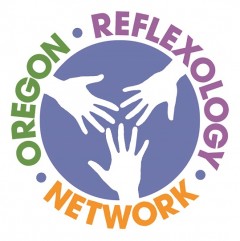What Is Reflexology?
Reflexology is holistic, non-invasive bodywork based in the theory that there are zones and reflex areas on the feet, hands and ears that connect with all parts of the body. Rhythmic pressure applied with specific thumb, finger and hand techniques to the feet, hands and ears causes deep relaxation, which in turn helps reduce stress and causes physiological changes in the body. Reflexology promotes balance in the body naturally.
How Can I Learn More About Reflexology?
You could schedule a session with an ORN reflexologist in your own city. Check our reflexologist listings by city at http://www.oregonreflexologynetwork.org/finda reflexologist.
You could experience reflexology first hand and your session would provide an excellent opportunity to talk to someone who has training and experience in the field.
To study reflexology, check our Events & Workshops page for upcoming classes: http://www.oregonreflexologynetwork.org/events_amp_workshops
For school listings, please see our Schools page: http://www.oregonreflexologynetwork.org/schools
Does Oregon Require a Reflexology License?
Not at this time.
Oregon changed its laws in 2008, separating reflexology from the jurisdiction of the Oregon Board of Massage. Reflexology became a stand-alone form of bodywork.
Chapter 687: Massage Therapists
2019 Oregon Revised Statutes
Updated (June 26, 2021)
https://oregon.public.law/statutes/ors_687.031
687.031 Application of ORS 687.011 to 687.250, 687.895 and 687.991.
(1) ORS 687.011 to 687.250, 687.895 and 687.991 do not apply to:
(i) Practitioners of reflexology who do not claim expressly or implicitly to be massage therapists and who limit their work to the practice of reflexology through the application of pressure with the thumbs to reflex points on the feet, hands and ears for the purpose of bringing the body into balance, thereby promoting the well-being of clients.
Does Washington Require a Reflexology License?
Yes.
As of July 1, 2013, anybody wishing to practice reflexology professionally in Washington State must go through the process of certification by the Washington State Department of Health.
Washington Education Requirements
School approval
In order to qualify for a reflexology certification in this state all applicants must show completion of a state-approved reflexology school or apprenticeship program before qualifying for a license (RCW 18.108.070).
Minimum program requirements
- Thirty hours of reflexology theory, history, zones, reflex points and relaxation response and contraindications
- Forty hours of study of body systems as related to reflexology
- Thirty hours of anatomy and physiology
- Five hours of business practice involving ethics, business standards and local/state laws and ordinances pertaining to the practice of reflexology
- Twenty-five hours or more of supervised practicum or clinical work
- Seventy hours of additional homework hours that can include giving and documenting client sessions as well as other written work
Etc.
Do Reflexologists Need Insurance?
Anyone working in a touch therapy needs to have personal liability insurance. This is considered prudent due to the potential risks of loss occurring from claims or lawsuits against a practitioner. Even if a claim is baseless or minor, the practitioner can incur significant expenses defending themselves. Fortunately, there are several insurance sources that offer coverage options. Read more ...
How Did ORN Get Started?
Because of a lack of reflexology guidelines in Oregon, a group of professional reflexologists created the Oregon Reflexology Network (ORN) in 2011.
They also affiliated with the US national reflexology association, Reflexology Association of America (RAA). http://reflexology-usa.org/
How Do I Become a Member?
Join Us! For details, go to our Join Us page: http://www.oregonreflexologynetwork.org/join_us
Why do I need 300 Hours of Training To Become A Professional Member?
As an affiliate of RAA, ORN abides by their professional membership standards for reflexologists, requiring 300 hours of education since 2014.
Anything less than 300 hours from recognized schools or workshops, qualifies a person for associate membership status in ORN.
How Do I Get 300 Hours?
Pathways to obtaining the 300 hours are described on the Reflexology Association of American (RAA) website:
http://reflexology-usa.org/professional-membership-requirements/
The bare outline from RAA:
Sixty percent (180 hours) of the 300-hours required for professional membership must be met in a live classroom with instructor interaction. The live hours must include training and supervised practicum in hands-on techniques, therapeutic communication skills and interpersonal and intrapersonal skills. Requirements are based on Reflexology education.
The remaining 40% (120 hours) may be met through:
- Internet or Distance Learning Classes
- Mentorship
- Independent Study
- Research Case Studies
- A combination of the above.
Reflexology Books?
There are many. Here is a brief list.
Flocco, Bill. Reflexology, Penguin Group, 2014
Kunz, Kevin and Barbara. The Complete Guide to Foot Reflexology, Prentice Hall, Inc. 1980
Kunz, Kevin and Barbara. Hand and Foot Reflexology: A self help guide, Prentice Hall 1984
Ingham, Eunice D. The Original Works of Eunice D. Ingham, Ingham Publishing, Inc.
Marquart, Hanne. Reflexotherapy of the Feet, Thieme, Stuttgart - New York - 2000
Norman, Laura. Feet First - A Guide to Foot Reflexology, Simon and Schuster, 1988
Issel, Christine. Reflexology: Art, Science and History, New Frontier Publishing, 1993


